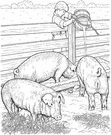pigpen
(redirected from pigpens)Also found in: Thesaurus, Idioms.
pig·pen
(pĭg′pĕn′)n.
1. A pen for pigs.
2. Informal A dirty or very untidy place.
American Heritage® Dictionary of the English Language, Fifth Edition. Copyright © 2016 by Houghton Mifflin Harcourt Publishing Company. Published by Houghton Mifflin Harcourt Publishing Company. All rights reserved.
pigpen
(ˈpɪɡˌpɛn)n
Also called: pigsty1. (Agriculture) a pen for pigs; sty
2. a dirty or untidy place
Collins English Dictionary – Complete and Unabridged, 12th Edition 2014 © HarperCollins Publishers 1991, 1994, 1998, 2000, 2003, 2006, 2007, 2009, 2011, 2014
pig•pen
(ˈpɪgˌpɛn)n.
1. a pen for keeping pigs.
2. a filthy or flagrantly untidy place.
[1795–1805]
Random House Kernerman Webster's College Dictionary, © 2010 K Dictionaries Ltd. Copyright 2005, 1997, 1991 by Random House, Inc. All rights reserved.
ThesaurusAntonymsRelated WordsSynonymsLegend:
Switch to new thesaurus
| Noun | 1. |  pigpen - a pen for swine pigpen - a pen for swine pen - an enclosure for confining livestock |
Based on WordNet 3.0, Farlex clipart collection. © 2003-2012 Princeton University, Farlex Inc.
Translations
disznóól
豚舎
Collins English/French Electronic Resource. © HarperCollins Publishers 2005